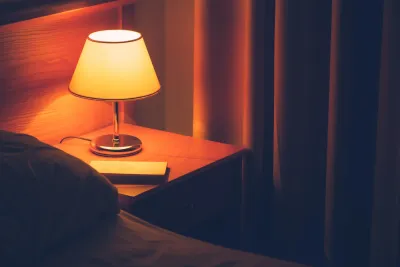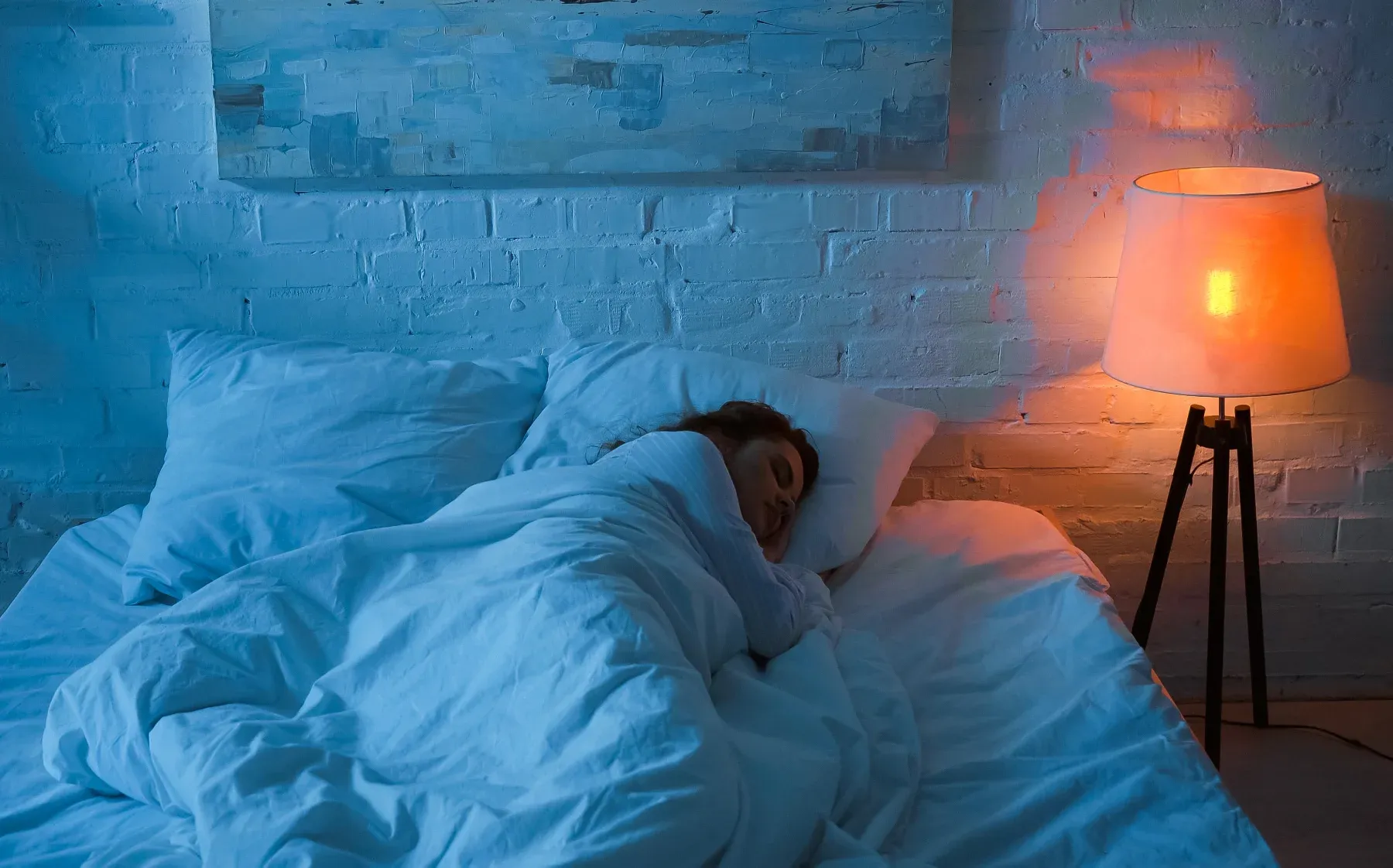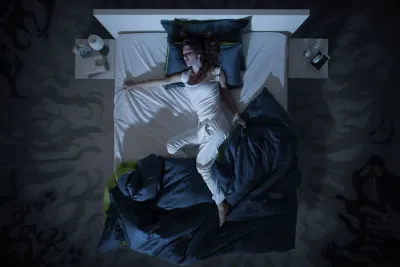
Key Takeaways
Light exposure during sleep can quietly interfere with your body clock, hormones, and overall sleep quality.
- Exposure to light at night can disrupt your circadian rhythm, making it harder to fall asleep and stay asleep.
- Bright or blue-toned light suppresses melatonin, the hormone that helps signal your body it’s time to wind down.
- Research links sleeping with lights on to higher risks of mood changes and depressive symptoms.
- Even low levels of ambient light can increase nighttime awakenings and reduce time spent in deep, restorative sleep.
- Regardless of light preference, maintaining a cool, stable sleep temperature with tools like the Chilipad, a temperature-controlled mattress system that can support better sleep.
The debate surrounding the effects of sleeping with lights on has gained traction in recent years, especially as more people become aware of the importance of sleep quality for better health.
While some individuals may find comfort in a softly lit room, research suggests that sleeping with lights on can have detrimental effects on the quality of sleep and health.
These adverse effects include negative impacts on cardiovascular and metabolic health, which can accumulate over time and potentially increase the risk of chronic diseases such as diabetes and insulin resistance.
Below, we’ll look at the implications of light exposure during sleep, the science behind it, and recommendations for creating a sleep-friendly environment. It's important to get enough sleep.
The Science of Sleep and Light
Light plays a crucial role in regulating our circadian rhythms, which are the body's internal clocks that dictate sleep-wake cycles. Natural light exposure during the day promotes alertness, while darkness signals the body to produce melatonin, a hormone that facilitates sleep.
However, artificial light, especially blue light emitted from screens, whether from your TV or smartphone, the artificial light can disrupt this natural process.
How It Impacts Circadian Rhythms
Research indicates that exposure to artificial light at night can lead to misaligned circadian rhythms. A study published in the View StudyProceedings of the National Academy of Sciences found that even moderate light exposure during sleep can activate the sympathetic nervous system, which is responsible for the body’s fight-or-flight response.
This activation from artificial light can prevent the body from entering a restful state, making it more difficult to fall asleep and leading to fragmented, light sleep and reduced time spent in restorative sleep stages.
Related Blog: Want to know what light sleep really means—and why it’s not as “light” as it sounds? Explore more about this crucial sleep stage in our deep dive.
No Matter the Light, Get the Temperature Right
Whether you sleep with the lights on or drift off in total darkness, the Chilipad helps you dial in the perfect sleep temperature, from a crisp 55°F to a cozy 115°F.
Lights On Affects Your Health
Keeping the lights on in the room while you sleep might seem harmless, but it can quietly lead to various health problems by impacting your quality of sleep and health. Here’s what to watch out for:
Disruption of Biological Clock
Exposure to light at night can disrupt the body’s biological clock, resulting in circadian misalignment. Exposure to blue light at night significantly suppresses melatonin levels, which can result in sleep disturbances, making it difficult to fall asleep or stay asleep.
Over time, this disruption can lead to chronic sleep issues and affect general health.
Related Blog: Looking to boost melatonin the natural way? Check out our blog for simple, effective tips to help your body wind down and sleep deeper—no supplements required.
Depression
Exposure to light at night—especially blue light from phones and screens—has been linked to mood issues like anxiety and depression. Not getting enough sleep can worsen things, leading to irritability and even hyperactivity in kids. Sleeping with some lights on may raise your risk of these problems, caused by poor sleep, by disrupting the deep sleep your brain needs to stay balanced.
Obesity
Research has shown that individuals who sleep with lights on are more likely to experience weight gain. Lack of sleep can increase food intake the following day and lead to late-night eating, contributing to obesity.
A study found that people exposed to light during sleep had higher insulin resistance, which is a risk factor for obesity and type 2 diabetes.
This disruption in circadian rhythm affects glucose metabolism, leading to insufficient regulation of blood glucose levels and increasing the risk of chronic diseases like insulin resistance and diabetes.
Melatonin Production
Melatonin, a hormone produced by the pineal gland in response to darkness, facilitates sleep. Exposure to bright light, especially blue light, inhibits melatonin production, making it harder to fall asleep. The suppression of melatonin by bright light can lead to a cycle of poor sleep and increased light sensitivity, further complicating sleep issues.

I Can Only Sleep with a Light On
For some individuals, sleeping with a light on may feel necessary due to various reasons, such as fear of the dark, anxiety, or a habit formed over time.
If you find it challenging to sleep without a light, consider the following strategies to build a relaxing bedtime routine and minimize the negative effects:
Use Low-Intensity Lights
Opt for a low-intensity nightlight that emits warm or red light, and avoid light exposure from bright sources, especially before bedtime, to improve sleep quality. This can help create a comforting environment while reducing the potential for sleep disruption.
Gradual Transition
If you are accustomed to sleeping with lights on, gradually reduce the brightness over time. Dim light or use a small nightlight, and slowly transition to lower levels of light as your body adjusts. Be aware that even dim light can interfere with a person's circadian rhythm and melatonin secretion.
While not ideal for sleep, if a small night light helps ease anxiety, opt for the dimmest setting possible—and consider using a timer so it doesn’t stay on all night.
Tip: It is important to get more light during the day to help regulate sensitivity to nighttime light exposure.
Create a Sleep Routine
Establish a calming bedtime routine that signals to your body that it’s time to wind down. This can include activities such as reading, meditating, listening to soothing sounds, or practicing relaxation techniques, which may help ease anxiety and promote better sleep.
Incorporating good sleep hygiene practices, such as managing light exposure and creating a relaxing sleeping environment, can further enhance sleep quality and overall health.
Consider Sleep Aids
If anxiety or fear of the dark is a significant barrier to sleeping without lights, consider using sleep aids such as eye masks or white noise machines to create a more conducive sleep environment.
A dark room is important for quality sleep, as exposure to light can disrupt the body's natural rhythms and lead to various health problems.
Consult a Professional
Consulting a healthcare professional may be beneficial if difficulties persist in sleeping without lights. They can help identify any underlying sleep disorders or anxiety issues that may be contributing to your need for light during sleep.
Recommendations for Better Sleep
To enhance the quality of your sleep and mitigate the harmful effects of light exposure, consider the following recommendations:
Bed Temperature
When it comes to optimizing your sleep, temperature plays a major role, and that’s where the Chilipad comes in. This smart, cooling mattress topper uses water-based technology to help you dial in your ideal sleep temp, from a refreshing 55°F to a cozy 115°F.
Chilipad Dock Pro
Our best cooling mattress pad, which lets you control your bed temperature between 55° and 115°F. It’s designed for hot sleepers, couples, and anyone who wants deeper, uninterrupted sleep—all controlled through a sleek, app-connected system.
Cube
The original water cooled mattress pad, which keeps your bed at a steady temperature between 60° and 115°F. It’s simple, reliable, and remote-controlled—perfect for anyone who wants consistent comfort without the use of technology.
Whether you’re battling night sweats, a warm bedroom, or just want more control over your sleep environment, the Chilipad can help you fall asleep faster and stay asleep longer.
Want more tips to level up your sleep game? Head over to our blog for smart, science-backed strategies on how to sleep better, night after night.
Create a Dark Sleep Environment
Setting the stage for great sleep starts with keeping your bedroom as dark as possible. Blackout curtains are a game-changer—they block out light sources such as streetlights, car headlights, and early morning natural sunlight that can disrupt your rest.
Even just one night of moderate light can throw off the quality of your sleep. In the evening, keep the lights dim in the hours leading up to bedtime to signal your body that it’s time to wind down.
Limit Technology Use
To protect your sleep, it’s important to reduce screen time in the hour before bed. Electronic devices emit blue light that interferes with melatonin production, making it harder to fall asleep. This is especially challenging for shift workers, who may benefit from wearing blue-light-blocking glasses to help counteract the effects.
If you do need to use your devices at night, make sure to lower the brightness and turn on night mode settings to minimize blue light exposure.
Establish a Consistent Sleep Routine
- Maintain Regular Sleep Schedule: Go to bed and wake up at the same time daily to reinforce your body’s natural sleep-wake cycle. Rapid eye movement (REM) sleep is crucial for overall health, including creativity, memory consolidation, and emotional regulation.
- Relaxing Activities: Incorporate calming activities like reading or meditating into your bedtime routine to promote relaxation.
Final Thought
Quality sleep plays a major role in overall health—especially when it comes to your heart. A dark, quiet bedroom sets the stage for better rest, while research shows that sleeping with lights on can interfere with sleep and even contribute to an increased risk of long-term health issues like cardiovascular concerns.
Making the switch to a darker sleep environment can significantly improve how well you rest and reduce potential risks. And if you’re still struggling to sleep without light, it might be worth talking to a healthcare professional for extra support.
For those looking to improve their sleep environment, Chilipad offers innovative solutions to help create the ideal sleeping conditions, resulting in a good night’s sleep.
Frequently asked questions
What Are The Health Effects Of Sleeping With The Lights On?
Sleeping with lights on—especially bright or blue-ish—can suppress melatonin, disturb circadian rhythms, reduce deep/REM sleep, and is linked to elevated risks of obesity, hypertension, diabetes, and mood disorders like depression.
Are There Any Benefits To Sleeping With A Light On?
Generally, no. But in specific cases—say, for young children fearing the dark or adults at risk of tripping at night—a dim, warm nightlight may help, as it avoids major melatonin disruption
How Can I Gradually Stop Sleeping With A Light On?
- Start by switching to a dim, warm/red-hued nightlight, then:
- Use blackout curtains or room-darkening blinds
- Lower house lighting before bed
- Keep electronics out of the bedroom
- Maintain consistent sleep/wake times
- Follow a calming bedtime routine (reading/bathing/meditation)
What Are Best Practices For A Sleep?Friendly Environment?
- Cool, Quiet, Dark Room: Ideal for deep sleep
- Avoid Blue Light Near Bedtime: Cut screens or use blue-light blockers
- Watch Meal/Exercise Timing: Stop eating 3+ hours before bed and avoid vigorous workouts late
- Wind-Down Rituals: Warm baths, reading, yoga—they ease the transition to sleep
Is It Bad to Sleep with the Lights On?
Yes, it can be for some individuals. Sleeping with lights on can disrupt melatonin production and your circadian rhythm, leading to lighter, less restorative sleep.









